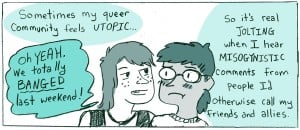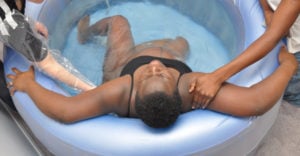It’s February, which is a month full of too much snow, Valentine’s Day, and National Eating Disorders Awareness Week.
And as much as I have feelings on all of those things, I’m going to focus today, shockingly, on the latter. In particular, I want to talk about eating disorder recovery.
And here’s why I want to talk about eating disorder recovery: because as much as it feels like we’re talking about it, it’s kind of like we’re not actually talking about it at all.
We talk about self-love, we talk about body acceptance, sometimes we talk about the obstacles that we come up against, but we don’t really talk about what recovery looks and feels like.
And I think that leaves a lot of people confused. So it makes sense that one of the most common questions I get from folks is just that: “How do I know when I’m recovered?” Or some variation of “I did such and such a thing – is that a relapse?” or “Is this your normal, average, run-of-the-mill bad body image day, or am I experiencing disordered thought patterns again?” And it’s like no one has the answers to these questions.
We’re all looking for a model against which to measure ourselves, but we can’t find one, so how are we supposed to know?
So that’s why I want to take time out to answer five relatively broad questions about eating disorder recovery to help you realize that however it’s going for you is exactly perfectly normal.
1. What Is Eating Disorder Recovery?
First we need to come up with a little definition of what we’re talking about when we say “eating disorder recovery.”
For me, I think of eating disorders in terms of engaging in behavior versus practicing recovery, similarly to how I think of alcoholism in terms of drinking versus practicing sobriety.
In both cases, the root problem – an eating disorder or addiction – are not choices. They’re results of brain chemistry. In both cases, you can actively choose to abstain from what your brain is asking you for. And in both cases, you can have the experience of the disordered thoughts never really leaving you completely, but the power to overcome engaging in behaviors.
Most people think of eating disorder recovery as somehow going back to what life was like before you developed an eating disorder. But for most people, that simply isn’t possible. An eating disorder is a hugely detrimental, damaging, and even traumatic part of your life that could have long-lasting – and even lifelong – effects. And even though that sucks, that’s okay.
Being in recovery doesn’t mean being perfect. It doesn’t mean never thinking about food in a negative way again. It doesn’t mean loving your body every single day. It means making telling your eating disorder to shut up a daily practice, and being compassionate with yourself around your feelings and experiences.
2. How Do I Tell the Difference Between Typical and Disordered?
Unfortunately, we live in a world where diet culture runs rampant and teaches all of us to hate the bodies that we have, and to strive for something different – oftentimes unattainable.
As such, most people are dissatisfied with their bodies and have a complicated relationship with food. But this leaves people in eating disorder recovery constantly wondering if what they’re doing is disordered or if it’s the (admittedly awful) new normal.
For example, if you’re looking at your naked body in the mirror, is that an example of learning your body, or are you body checking? If you refuse a slice of cake, is it because you really don’t want it, or because fear is creeping up again?
These are questions that we need to ask ourselves constantly in eating disorder recovery. And it’s annoying because you wish that you could just go back to a place of never even thinking about it, but eating disorder [recovery] involves a lot of deconstructing of your own thoughts. It’s okay to stop and ask yourself what’s going on.
My go-to answer to this question is this: If you are doing something in response to negative feelings about food or your body, and if you find yourself doing this with whatever you define as regularity, then it might be time to check in with your support system about the possibility of crawling toward relapse. But if these negative feels are relatively few and far between, you’re still on the recovery track.
3. If I Mess Up, Am I a Failure?
No. Next question.
Okay, but seriously, sometimes we find that old habits die hard. If you restricted today, or if you binged today, or if you purged today, apologize to yourself before falling asleep. When you wake up, recommit to recovery.
We all have off days. Recognizing them as such and wanting to eradicate them is what a recovery mindset is.
4. Sometimes I Really Miss My Eating Disorder – Is That Normal?
Absolutely, positively, 100% normal.
For a lot of people, their eating disorder can consume them and their sense of self. Some people say that they feel like their experience with their eating disorder defined them, and that they’re not sure who they are without it.
That’s really common.
It’s also your eating disorder talking and trying to convince you that you need it – and you don’t.
Also, for a lot of people – myself included – their eating disorder worked as a coping mechanism, supposedly helping them process a difficult or turbulent time.
So then when stress or anxiety creeps up, they remember that they have a go-to way to cope. But you have to remember that you have a whole toolbox of coping mechanisms, and that the eating disorder is simply what your brain is tell you is the easiest because our brains love patterns.
Tell your brain that you know better, and choose a different method – one that nourishes you.
5. How Do I Know When I’m Fully Recovered?
Personally, I’d like to rid ourselves of the notion of full recovery because it feels too close to perfect recovery for my comfort level.
Is there really ever such a thing as fully healing from anything?
Take break-ups, for example. You eventually get to a point when you stop crying, and you even eventually get to a point where you stop actively thinking about your ex, but that doesn’t mean that you don’t feel some kind of pang when you see their name.
It’s possible to be over something without forgetting that it ever existed or affected you. Eating disorders are like that.
You can move past them and toward a healthier, happier you, and that movement is constant because you’re always growing, always evolving. And that’s why recovery is a journey and not a destination – because self-actualization is something that we’re all working toward.
You are a work in progress – not because you’re in eating disorder recovery, but because you’re a human being. And that process is a really beautiful thing.




















